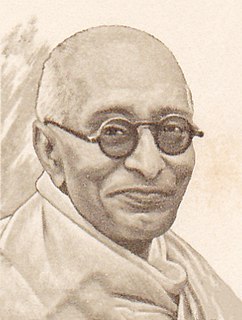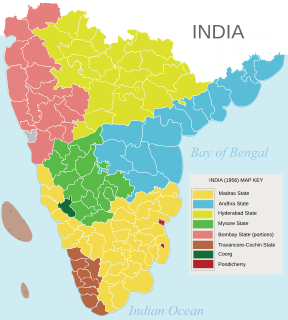Related Research Articles

Chakravarti Rajagopalachari, informally called Rajaji or C.R., was an Indian statesman, writer, lawyer, and independence activist. Rajagopalachari was the last Governor-General of India, as India soon became a Republic in 1950. He was also the first Indian-born governor-general, as all previous holders of the post were British nationals. He also served as leader of the Indian National Congress, Premier of the Madras Presidency, Governor of West Bengal, Minister for Home Affairs of the Indian Union and Chief Minister of Madras state. Rajagopalachari founded the Swatantra Party and was one of the first recipients of India's highest civilian award, the Bharat Ratna. He vehemently opposed the use of nuclear weapons and was a proponent of world peace and disarmament. During his lifetime, he also acquired the nickname 'Mango of Salem'.

Minjur Bhakthavatsalam was an Indian independence activist and politician who served as the chief minister of Madras State from 2 October 1963 to 6 March 1967. He was the last Congress chief minister of Tamil Nadu and the last to have taken part in the Indian independence movement.

P. Kakkan or fondly known as Kakkanji, was an Indian politician and freedom fighter who served as a member of the Constituent Assembly of India, Member of Parliament, President of the Tamil Nadu Congress Committee and in various ministerial posts in Congress governments in the erstwhile Madras state between 1957 and 1967.

The fourth legislative assembly election of Madras State was held in February 1967. The Dravida Munnetra Kazhagam (DMK) led coalition under the leadership of C.N. Annadurai won the election defeating the Indian National Congress (Congress). Anti-Hindi agitations, the rising prices of essential commodities, and a shortage of rice were the dominant issues. K. Kamaraj's resignation as the Chief Minister in 1963, to concentrate on party affairs, along with persistent rumors of corruption had weakened the incumbent Congress Government. This was the second time after Communist Party of India winning Kerala assembly elections in 1957, for a non-Congress party to gain the majority in a state in India, and the last time that Congress held power in Tamil Nadu. It was the first time a party or pre-election alliance formed a non-Congress government with an absolute majority. It marked the beginning of Dravidian dominance in the politics of Tamil Nadu. Annadurai, who became the first non-Congress chief minister of post-independence Tamil Nadu, died in office in 1969 and V.R. Nedunchezhiyan took over as acting chief minister.
Shanmugha Rajeswara Sethupathi or Naganatha Sethupathi was an Indian politician of the Justice Party and later, the Indian National Congress and head of the zamindari of Ramnad from 1929 to 1967. He was a member of the Madras Legislative Assembly from 1951 to 1967 and served as a minister in C. Rajagopalachari and K. Kamaraj's cabinets. He was popular as the main political opponent of U. Muthuramalingam Thevar.
M. Alagappa Manickavelu Naicker or simply, M. A. Manickavelu was an Indian politician of the Indian National Congress and founder of the Commonweal Party. He served as the Minister of Revenue for the Madras state from 1953 to 1962. He also served as a member of the Rajya Sabha from 1962 to 1964. During 1964-70 he was the Chairman of the Tamil Nadu Legislative Council

The first legislative assembly Election to the Madras state based on universal adult suffrage was held in March 1952. This was the first election held in Madras state after the Indian Independence. This election was officially known as the 1951 Madras State Election, even though through delays, actual voting didn't take place until early 1952.

The second legislative assembly election to the Madras state was held on 31 March 1957. This was the first election held after the linguistic reorganization of Madras state in 1954. Indian National Congress and its leader K. Kamaraj won the election, and defeated its rival Dravida Munnetra Kazhagam. In 1954, due to the resignation of C. Rajagopalachari, for his controversial Kula Kalvi Thittam, the leadership of Congress was contested, between K. Kamaraj, and C. Subramaniam. Eventually, K. Kamaraj, won the support of the party, was elected leader and chief minister of Madras State in 1954. In a surprise move, he appointed both M. Bhaktavatsalam and C. Subramaniam, in his cabinet, allowing great unity amongst Congress, that ruled the state of Madras, for the next decade. This election saw future DMK leaders, M. Karunanidhi and K. Anbazhagan winning their first MLA seat in the legislative assembly.

The third legislative assembly election to the Madras state was held on 21 February 1962. The Indian National Congress party, led by K. Kamaraj, won the election. Dravida Munnetra Kazhagam made significant in-roads in the election and emerged as the second party for the first time by winning 50 seats.
Lourdammal Simon was an Indian politician and former Member of the Legislative Assembly and Minister for Local Administration and Fisheries of Madras State during 1957–1962.
M. C. Balan was an Indian politician and former Member of the Legislative Assembly. He was elected to the Tamil Nadu legislative assembly as a Dravida Munnetra Kazhagam candidate from Nagercoil constituency in Kanyakumari district in 1967 election. He was defeated by A. Chidambaranatha Nadar in 1962 election in Nagercoil legislative assembly constituency. He was defeated by K. Kamaraj in Nagercoil parliamentary constituency in 1971 Indian general election.
V. Ramaiah is an Indian politician Former member of parliament and former Member of the Legislative Assembly of Tamil Nadu. He was elected to the Tamil Nadu legislative assembly as an Indian National Congress candidate from Tirumayam constituency in 1957 and 1962. who has been a minister in Kamaraj and Bhakthavachalam cabinet elections.
B. Parameswaran was an Indian politician and former Member of the Legislative Assembly of Tamil Nadu. He was elected to the Tamil Nadu legislative assembly from Maduranthakam constituency as an Indian National Congress candidate in 1946, 1952, and 1962 elections. He was the grandson of Rettamalai Srinivasan, a pioneer in the Scheduled Caste movement. He was educated at the St. Gabriels High School and Presidency College, Madras. He served as private secretary to another Scheduled Caste leader M. C. Rajah. During 7 April 1949 – 9 April 1952, he was the minister for Firka development, Khadi, Cottage industries, Fisheries, Cinchona and Harijan uplift in the P. S. Kumaraswamy Raja cabinet. During 1952–54, he was the mayor of Madras. From 13 April 1954 until 31 March 1957, he was the minister for Transport, Harijan Uplift, Hindu Religious Endowments, Registration and Prohibition in K. Kamaraj's first cabinet. During 1958–62, he was a member of the Rajya Sabha – the upper house of the Indian parliament.

The second legislative assembly election for the Madras Presidency after the establishment of a bicameral legislature by the Government of India Act of 1935 was held in 1946. The election was held after 6 years of Governor's rule starting from 1939, when the Indian National Congress government of C. Rajagopalachari resigned protesting Indian involvement in World War II. This was the last election held in the presidency - after Indian independence in 1947, the presidency became the Madras state. The election was held simultaneously with that of the Legislative Council. The Congress swept the polls by winning 163 out of 215 seats. The years after this election saw factionalism in Madras Congress party with divisions across regional and communal lines. Competition among T. Prakasam, C. Rajagopalachari and K. Kamaraj resulted in the election of Prakasam as the Chief Minister initially. But he was later defeated by Omandur Ramaswamy Reddiar with Kamaraj's support. In turn, Reddiar himself was ousted to make way for P. S. Kumaraswamy Raja with the support of Kamaraj.
The second legislative council election for the Madras Presidency after the establishment of a bicameral legislature by the Government of India Act of 1935 was held in March 1946. The election was held after 6 years of Governor's rule starting from 1939, when the Indian National Congress government of C. Rajagopalachari resigned protesting Indian involvement in World War II. This was the last direct election held for the Madras Legislative Council in the presidency - after Indian independence in 1947, the presidency became the Madras state and direct elections to the council were abolished. The election was held simultaneously with that of the Legislative Assembly. The Congress swept the polls by winning 32 out of 46 seats. The years after this election saw factionalism in Madras Congress party with divisions across regional and communal lines. Competition among T. Prakasam, C. Rajagopalachari and K. Kamaraj resulted in the election of Prakasam as the Chief Minister initially. But he was later defeated by Omandur Ramaswamy Reddiar with Kamaraj's support. In turn, Reddiar himself was ousted to make way for P. S. Kumaraswamy Raja with the support of Kamaraj.
Jothi Venkatachalam was an Indian politician who served as Governor of Kerala and Member of the Legislative Assembly of Tamil Nadu.

Madras State was a state of India during the mid-20th century. At the time of its formation in 1950, it included the whole of present-day Tamil Nadu, Coastal Andhra, Rayalaseema, the Malabar region of North and central Kerala, and Bellary, South Canara. Coastal Andhra and Rayalaseema were separated to form Andhra State in 1953, while South Canara and Bellary districts were merged with Mysore State, and Malabar District with the State of Travancore-Cochin to form Kerala in 1956. Post State Reorganization in 1956, the remaining Madras State was renamed to Tamil Nadu, meaning "Tamil country" on January 14, 1969.
The third legislative assembly of Madras state was constituted in March 1962 after the assembly election which was held in February 1962.

K. Kamaraj was sworn in as the Chief Minister of Madras Province on 13 April 1954. K. Kamaraj ousted Rajaji on 31 March 1954 and was elected the leader of Congress Legislative Party. Kamaraj consolidated his position by offering ministerial position to leaders of Tamil Nadu Toilers Party and Commonweal Party. This event marked the end of Brahmin domination in Tamil Nadu Congress.
References
- ↑ 1962 Madras State Election Results, Election Commission of India
- ↑ Kandaswamy. P (2008). The political Career of K. Kamaraj. Concept Publishing Company. pp. 62–64. ISBN 81-7122-801-8
- ↑ The Madras Legislative Assembly, Third Assembly I Session
- ↑ The Madras Legislative Assembly, Third Assembly II Session